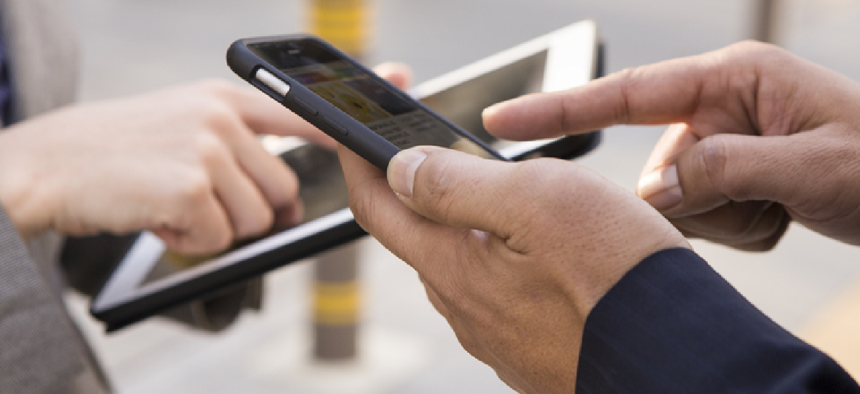Frictionless access to city, county services

The myWyco app breaks down stovepipes to erase the "blurry" line residents see between services provided by Kansas' Wyandotte County and Kansas City.
Residents of Wyandotte County and Kansas City, Kan., can take care of state and local government service requests and payments through a single app. The cloud-based myWyco app lets both county and city residents submit 311 requests, renew their state vehicle registrations or pay taxes without having to open multiple applications or visit several websites.
For residents, the line between state government and local government services is "blurry at best," said Alan Howze, chief knowledge officer for the Unified Government of Wyandotte County and Kansas City. "By providing a seamless and frictionless experience for residents to conduct their government business – whether that’s local government or state government – that really increases the confidence that residents have and makes it just a better customer experience,” he said.
The Unified Government worked with PayIt, a Kansas City-based company that offers a cloud-based platform for web and mobile government payments. PayIt built myWyco on Amazon Web Services’ GovCloud, creating a single app through which residents could submit 311 requests and pay property taxes. Available for download to Android and Apple devices, the app has been available since last fall.
When the state’s iKan app, which lets residents renew vehicle registrations, launched in April, it was also integrated into myWyco. The county uses Safe Software’s FME as its integration platform, which sits between business applications and the data the county gets from the PayIt system, Howze said.
“What we’re trying to do is knit together these core business systems with a new, much more user-friendly front end that is consistent across the web as well as mobile-based applications, which is our myWyco application,” he said.
After downloading the app, users can sign in as a guest or link their email or social media accounts to it, PayIt Managing Director Grant Gordon said. It uses a decision tree to figure out what users are looking for.
“We have a secure, encrypted communication between [the county’s] systems and ours to actually pass information, to validate users, to pull up accounts or balances, and then we tokenize any sort of payment information so we don’t actually store that on the app, so we remain PCI-compliant,” Gordon said. “We allow the user to use that account for multiple needs. They have a stored credit [card] number that’s tokenized, so they can use it for vehicle registration and then can pay property taxes for that, too.”
The first part of the app to go live was 311 submissions for the Public Works Department. The county has several back-office work order management systems for different departments and tasks such as code enforcement, Howze said. FME connects PayIt to those back-office systems for bidirectional communication.
For instance, when a request comes in through myWyco for Public Works, it’s noted in the content management system and routed directly to the department’s queue. When the action is complete, that information is loaded into the Lucity work order system and then through FME to PayIt, which notifies the submitter by email or a pop-up notification via the app that the job has been completed.
Property tax payments are simpler because the county has a single tax payment system. It receives batch data daily from PayIt about transactions that were made in the past 22 hours. The system is updated, and the county provides a fresh file to PayIt, so users can see their status as paid.
What’s more, PayIt automates the reconciliation process for payments. “Previously, treasury staff was manually reconciling online transaction payments, and it consumed multiple hours in a day,” Howze said. “Now, that reconciliation is being automated to the point where it just requires a look over by a staff member, so it’s saved hours of [employee] time.”
The Unified Government also started offering residents free payment options by e-check or via the ACH financial transaction network. Credit card payments, however, come with a fee. By encouraging free payment options and charging a small fee for credit card payments, "we’ve seen our transaction costs decline significantly to the tune of over $100,000 in avoided transaction fees … in the first quarter of this year alone,” Howze said.
Additionally, the government has seen a 35 percent increase in the number of transactions completed online and an 80 percent increase in revenues collected through online purchases, he said.
Features that are in the works include ordering vital records such as marriage, birth and death certificates – an iKan function – and pushing out police notifications – a myWyco element, Gordon said. Howze said he is also looking at rolling out the ability to pay municipal court fines and fees, such as parking and speeding tickets, through the app.
“If we can put those on a single intuitive application that knows that I submitted a 311 request for my trash pickup and remind me when my property tax is due and can allow me to pay parking tickets or a speeding ticket, that’s a lot of added value for residents without the proliferation of applications for specific functions,” he said.
The Unified Government was able to pull this off by working closely across department lines and with the vendors, Gordon said, while also integrating IT with lines of business. “The ability to break down stovepipes and look at and deliver an integrated solution that works across departments is one of the ways we really see for improving experience for our residents and delivering value to the government.”





